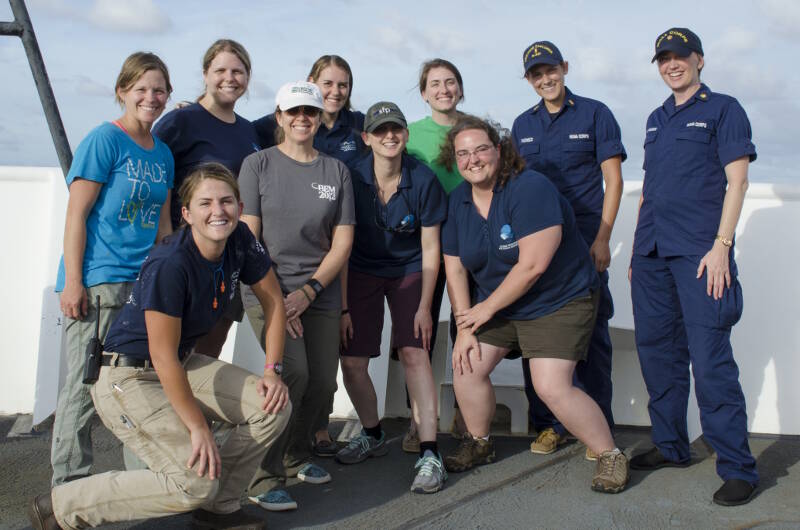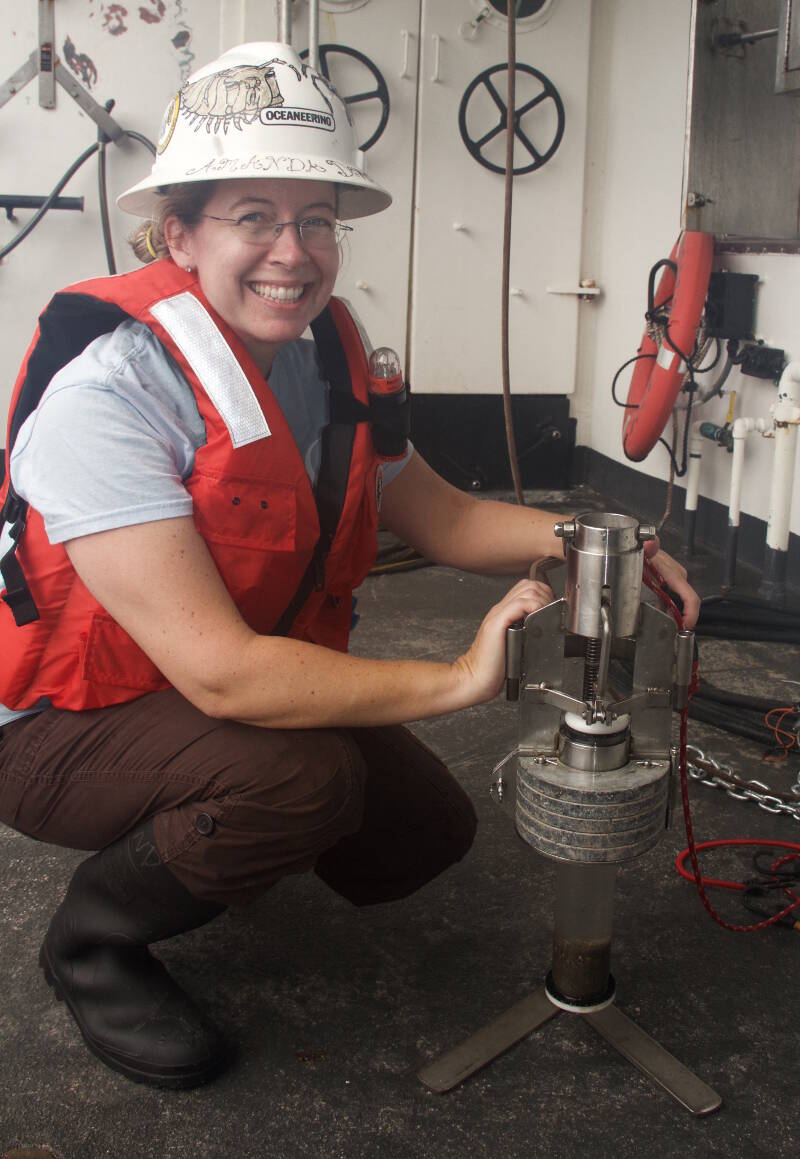
By Adrienne Copeland - NOAA Office of Ocean Exploration and Research
March 8, 2017

The women on board the Okeanos Explorer during the Discovering the Deep: Exploring Remote Pacific Marine Protected Areas expedition. These women represent all aspects of life at sea, from the officers, deck crew, engineers, support staff, and scientists. Image courtesy of the NOAA Office of Ocean Exploration and Research, Discovering the Deep: Exploring Remote Pacific MPAs. Download larger version (jpg, 7.0 MB).
With a record number of women on board this expedition, what better way to celebrate National Women's History Month on NOAA Ship Okeanos Explorer than to interview one of the scientists leading the expedition? You may have heard her on the live feeds during previous expeditions and she is famous for being one of the stars of “deep-sea TV.” We also learned about her before she became a scientist, but now we want to know about her life as a scientist, and specifically a scientist at sea.

Co-host of “Deep-sea TV,” Dr. Amanda Demopoulos, holds a monocore, an instrument used to collect a discrete sample of the bottom sediments. Image courtesy of the NOAA Office of Ocean Exploration and Research, Deepwater Wonders of Wake. Download larger version (jpg, 4.2 MB).
I got to sit down with Dr. Amanda Demopoulos, one of our two scientists on board this expedition, to get an inside look at what it is like to be a female scientist at sea.
Q: You seem very comfortable going to sea. How many different research vessels have you been on?
A: Over 10.
Q: What is one important lesson you have learned from spending long periods of time on these different vessels?
A: That attitude is everything and to not take things too seriously. If things can go wrong, they may or will go wrong. A good sense of humor helps you get through anything.
I also did not know how to tie a bowline knot when I first started sailing. It was the first knot I learned how to tie and I have used it on every cruise since. So make sure you learn how to tie one!
Q: What is it like being a female scientist at sea?
A: I have been sailing on vessels since 1995. Personally, I have seen a change throughout my time starting as undergraduate student to now at United States Geological Survey (USGS). It is now part of the status quo for women to participate in every operation at sea. For example, on the Okeanos Explorer for this expedition, we have women working as part of the deck crew and engineering staff, as officers, and as members of the science team. It is now more accepted for women to leave home and go to sea. I have had great experiences as a woman at sea which keeps me coming back.
Q: What keeps bringing you back to the Okeanos Explorer in particular?
A: I enjoy sailing on the Okeanos Explorer for number of reasons. I am always really impressed by the professionalism of the crew, both the ship and remotely operated vehicle teams. Doing deep-sea research is highly complex logistically, and the crew and support staff on the Okeanos Explorer do it fairly seamlessly. This puts us science leads at ease. We can focus on the science and not worry about the logistics that go on behind the scenes. It is a great opportunity to lead dives on this ship and I can take what I learn about seamless operations to other ships.
But really it is the opportunity to go to these new places where no person has gone before.
Q: As a scientist, both shore-based and on board the ship, you have seen many hours of Deep Discoverer (D2) dive footage. What is the coolest thing you have seen on the Okeanos Explorer feeds?
A: My most exciting dive with D2 was a canyon dive during the Northeast U.S. Canyons Expedition 2013. At this point, we had already done many canyon dives and as we descended to the seafloor, I saw elongate dead mussel shells. I wondered to myself if we were near a hydrothermal seep. We were not aware of any seeps in this area, though. Then, as D2 was coming over a mound, we saw this dense carpeting of mussels. I was so excited. I think everyone on the call got to hear how excited I was because it was a completely unknown habitat. We had no idea that a seep was going to be in this dive area. It was so interesting and thrilling to uncover this mystery.
Q: Aside from uncovering mysteries of the deep, what is your superpower while out at sea?
A: At sea, I am able to deal with and manage sleep deprivation really well, which allows me to get so much done. I feel like I thrive at sea and in this environment, I able to do everything better.
Q: In honor of National Women’s History Month, which female scientist (either current or from history) have you found to be most inspiring and why?
A: There have been many women who have mentored me directly or indirectly in my life as a developing scientist. Two people specifically helped me become who I am. First is my mother. [Learn more about how her mother’s tremendous work ethic and work as a neuropathologist at Michigan State Univeristy shaped her.]
The second person I met as an undergraduate student. I had an undergraduate fellowship with Lisa Levin at the Scripps Institution of Oceanography, and she opened my eyes to the benthic world. I had taken a benthic ecology course in undergrad but did not fully understand the complexities of these ecosystems ranging from wetlands to the deep sea. She allowed me to test my hypotheses in the wetlands, which prepared me for my work with mangroves in Hawaii for graduate school. She was very good at challenging people, but in a way that helps them grow. I returned to her lab as a postdoctoral researcher and she continued to challenge me professionally, but allowed me to be successful personally as well. I was able to keep working while growing my family. Her ability to lead by example is inspiring. Without her, I do not think I would have the career I have.
Q: Tell me about a project or accomplishment that you consider to be the most significant or inspiring in your career to date?
A: The work examining the oil impacts on deep-sea communities in the Gulf of Mexico. In 2007, my team and I started assessing deep-sea corals communities. We were trying to understand how deep-sea corals influence surrounding environments, also known as the reef effect. In 2010, when the Deepwater Horizon spill happened in the Gulf of Mexico, we already had a good baseline and background information on what a healthy coral reef in the Gulf looked like, allowing us to assess the impacts of the spill on reef habitats. Seven years later, we are still investigating the impacts of the spill to these environments. If I had not gotten the job at USGS, I do not think I would have had this experience. It has been a tremendous opportunity to provide the scientific input needed to better manage these areas.
Q: Okay, now for the most important question: If you could be any sea creature, which would you be and why?
A: Hmmm, that is hard. I would probably want to be any animal that can travel vast distances, maybe a tuna. I think it would be cool to travel far-reaching distances and see the different environments and ecosystems in the ocean.
I don’t think I would do well as a deep-sea coral. It would be boring staying in one place for thousands of years. As a benthic ecologist, I do not think I would do well as the critters I study.